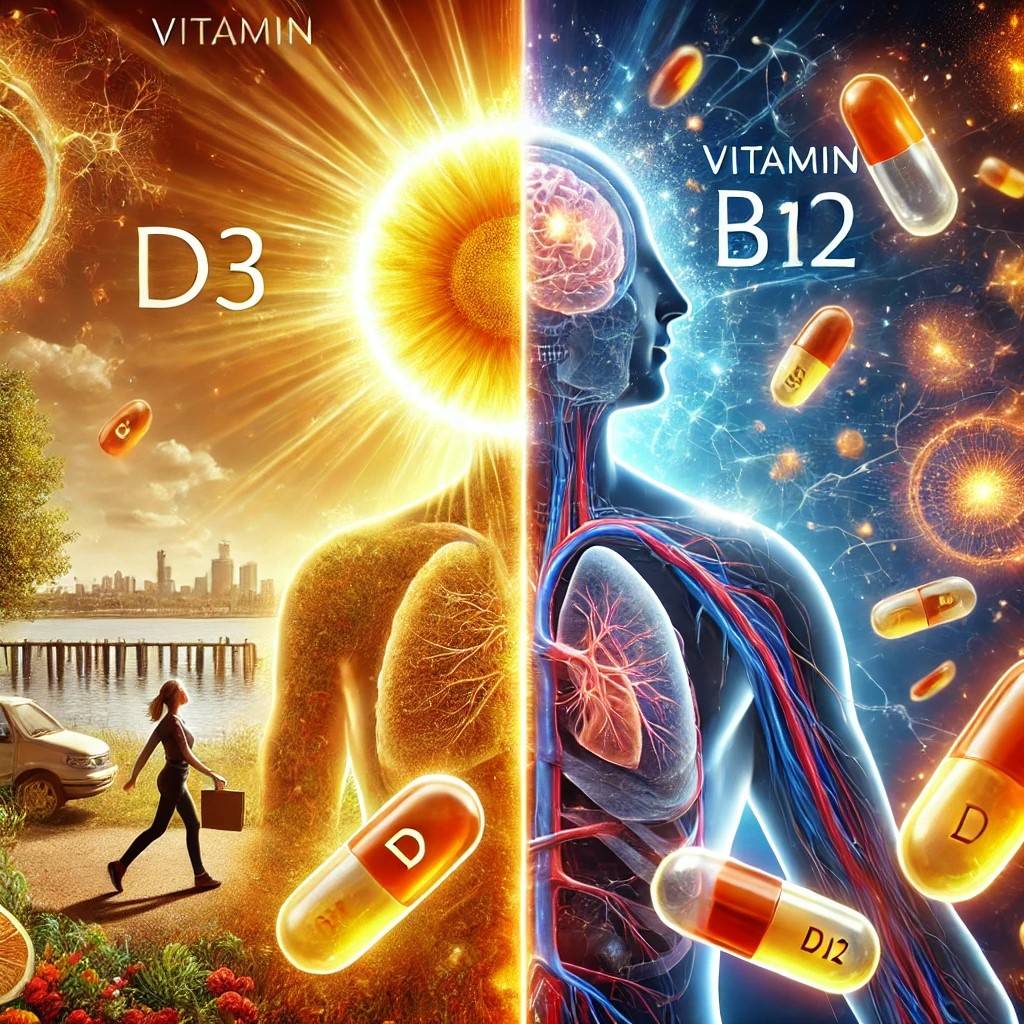Discover the best time to take D3 and B12 to maximize energy and immunity. Learn expert tips for optimal absorption and effectiveness. Boost your health today!
Have you ever wondered when you should take your vitamins to get the most out of them? I know I have! After trying different times and methods,
I’ve learned a lot about the best time to take D3 and B12. I’ll share what I’ve learned to help boost your energy and immunity.
Why Are D3 and B12 Important?

Before we talk about the best time to take D3 and B12, let’s understand why these vitamins matter so much:
- Vitamin D3: often called the “sunshine vitamin,” helps your body absorb calcium to strengthen bones and teeth. It also supports your immune system, improves mood, and reduces inflammation.
- Vitamin B12: This vitamin is a powerhouse for energy. It helps your body produce red blood cells, supports brain function, and keeps your nervous system healthy.
Together, D3 and B12 work like a dream team to keep you feeling energized and healthy. But to get the full benefits, you need to take them at the optimal time.
Understanding Fat-Soluble vs Water-Soluble Vitamins
Before we dive into the best time to take D3 and B12, it’s important to understand how our bodies absorb these vitamins.
- Vitamin D3 is fat-soluble. This means it needs fat to be absorbed well.
- Vitamin B12 is water-soluble. It dissolves in water and doesn’t need fat.
This difference is key to knowing when to take each vitamin for the best results.
Best Time to Take Vitamin D3
For vitamin D3, timing is all about fat. Here’s what I’ve discovered to be most effective:
- Take it with a meal that has some fat in it.
- Morning or evening doesn’t matter much, as long as you have it with food.
- Be consistent – take it concurrently each day.
I like to take my D3 for breakfast. I usually have eggs or avocado toast, which have enough fat to help my body absorb vitamins.
Best Time to Take D3 and B12
Take D3 and B12 with Food
Both vitamins are absorbed better when taken with food. Here’s why:
- Vitamin D3 is a fat-soluble vitamin, meaning it dissolves in fat. Taking it with a meal that contains healthy fats (like avocado, nuts, or olive oil) helps your body absorb it more effectively.
- Vitamin B12 is water-soluble but taking it with food can still help reduce stomach upset and improve absorption.
Morning vs. Night: When to Take D3 and B12
- Morning: Taking D3 and B12 in the morning is a successful way to start your day. It gives you an energy boost and ensures you don’t forget to take them.
- Night: If you forget in the morning, taking them at night is fine. However, some people find that B12 gives them a burst of energy, which might make it harder to sleep.
Can You Take D3 and B12 Together?
Good news! You can take D3 and B12 concurrently. But to get the most out of both:
- Take them with your first meal of the day.
- Make sure the meal has some fat for the D3.
- If possible, take B12 about an hour after eating.
This way, you’re giving both vitamins their best chance to work well in your body.
Tips for Taking D3 and B12
Here are some extra tips I’ve picked:
- Stay consistent: Take them concurrently each day.
- Don’t overdo it: Follow the recommended doses.
- Check with your doctor: Especially if you’re on other medications.
- Be patient: It can take a few weeks to feel the full effects.
I’ve found that setting a daily reminder on my phone helps me remember to take my vitamins.
Special Considerations
Sometimes, you might need to adjust when you take these vitamins:
For Shift Workers
If you work nights, take your vitamins when you wake up, regardless of the time.
For People with Digestive Issues
You might need to be extra careful about timing. Talk to your doctor for personalized advice.
For Vegetarians and Vegans
You might need an extra B12. Consider a sublingual (under the tongue) form for better absorption.
How to Know If You Need D3 and B12
Not sure if you need these vitamins? Look out for these signs:
- Feeling tired all the time
- Getting sick often
- Feeling down or moody
- Muscle weakness
A simple blood test can tell you if you’re low on these vitamins. I was surprised to find out I was low in D3 even though I spent time outdoors!
Natural Sources of D3 and B12
While supplements are great, you can also get these vitamins from food:
- Sunlight (your body makes D3 when your skin is exposed to the sun)
- Fatty fish like salmon
- Egg yolks
- Fortified milk
- Meat and poultry
- Fish
- Dairy products
- Fortified cereals
I include these foods in my diet, but I still take supplements to make sure I’m getting enough.
The Impact of Timing on Vitamin Effectiveness
Timing really can make a difference in how well your vitamins work. I’ve noticed that since I started paying attention when I take my D3 and B12, I feel better overall. The optimal vitamin intake routine isn’t just about taking your vitamins every day but also about taking them at the right time.
For example, taking D3 with a fatty meal helps with vitamin D3 and B12 bioavailability. This means your body can use more vitamins. On the other hand, taking B12 on an empty stomach in the morning can help with energy levels throughout the day.
Creating Your Perfect Vitamin Routine
Everyone’s body is different, so the best time to take D3 and B12 might vary a bit from person to person. Here’s what I suggest:
- Start with the general guidelines (D3 with a fatty meal, B12 on an empty stomach).
- Pay attention to how you feel.
- Adjust if needed.
For me, taking D3 with breakfast and B12 first thing in the morning works successfully. But you might find different routines work better for you.
The Role of Other Factors in Vitamin Absorption
While timing is important, other factors can affect how well your body absorbs vitamins:
- Stress: High stress can interfere with vitamin absorption.
- Sleep: Good sleep helps your body use vitamins better.
- Exercise: Regular exercise can improve overall vitamin absorption.
I’ve found that managing my stress and getting enough sleep makes a big difference in how even when taking the same vitamins.
Combining D3 and B12 with Other Supplements
If you’re taking other supplements, you might wonder about nutrient interaction in supplement timing. Here’s what I’ve learned:
- Calcium can interfere with iron absorption, so take these at different times.
- Vitamin C can help with iron absorption, so take them together.
- Magnesium and vitamin D work well together.
Always check with your doctor or pharmacist if you’re unsure about combining supplements.
The Long-Term Benefits of Proper Vitamin Timing
Sticking to a vitamin routine can have successful long-term benefits. Since I started paying attention to the best time to take D3 and B12, I’ve noticed:
- More consistent energy levels
- Fewer colds and illnesses
- Better mood overall
- Stronger nails and healthier skin
Remember, these changes don’t happen overnight. It took a few weeks before I noticed the difference.
FAQs about Best Time to Take D3 and B12
Can I take D3 and B12 together?
Yes, you can take D3 and B12 together. However, for best absorption, it’s ideal to take D3 with a meal containing fat, while B12 is better absorbed on an empty stomach. If you need to take them, it’s okay to do so with a meal but take B12 about an hour after eating if possible.
When should I take Vitamin D3 morning or night?
You can take Vitamin D3 either in the morning or at night. The salient factor is to take it with a meal that contains some fat to help with absorption. Choose a time that’s easy for you to remember and stick to it consistently. Some people prefer morning with breakfast, while others find it convenient to have it with dinner.
When should I take B12, morning, or night?
It’s best to take a B12 in the morning on an empty stomach. This allows for better absorption. If morning doesn’t work for you, you can take at least two hours after eating and 30 minutes before your next meal. Taking B12 at night is also fine, but some people report it can affect their sleep if taken too close to bedtime.
Is it okay to take vitamin D and B12 at night?
Yes, it’s okay to take vitamin D and B12 at night. For vitamin D, take it with your evening meal to ensure proper absorption. For B12, if you take it at night, have it a couple of hours after your last meal. However, some people find B12 can be energizing, so if you notice it affects your sleep, consider taking it earlier in the day.
My Personal Experience
I’ve been taking D3 and B12 for years, and I’ve noticed an enormous difference in my energy levels and overall health. I like to take them in the morning with breakfast because it’s easy to remember, and I feel energized for the day ahead. I’ve also tested taking them at night, but I found that B12 sometimes kept me awake.
Conclusion: Finding Your Best Time to Take D3 and B12
Finding the best time to take D3 and B12 can make a big difference in how you feel. Remember:
- Take D3 with a fatty meal
- Take B12 on an empty stomach or an hour after eating
- Be consistent and patient
By following these tips, you’re on your way to better energy and a stronger immune system.
Don’t be afraid to experiment a little to find what works best for you. Your body will thank you!

Adel Galal is a health and wellness writer with over 30 years of experience studying and writing about health, fitness, nutrition, and healthy living. He is the founder of NextFitLife.com, where he shares practical, evidence-based guidance to support long-term health at any age. Adel’s mission is simple:
to help people make smarter health choices that fit real life, at any age.



